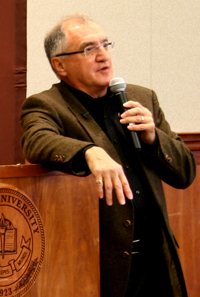True crime
True crime

Celebrated crime reporter George Anastasia came to Rowan November 16 for a frank talk about the importance of journalism, doing what you love, and, of course, covering the Mob.
Anastasia, who has covered organized crime at the Philadelphia Inquirer for more than 30 years - and was once himself the target of a mob hit - was avuncular and charming as he regaled several hundred listeners in the Eynon Ballroom but left no doubt that he's mixed it up with mobsters.
Born in South Philadelphia but raised in Westville, Anastasia told how, for years, he's worked sources deep within La Cosa Nostra, shared lunches and drinks with hired hit men, and told stories that needed telling - that it was his job to tell - even if it meant putting himself in danger.
And at least one time it did. In the mid-1990s, while covering Philadelphia crime boss John Stanfa, a hit was ordered on the enterprising reporter - a hand-grenade attack on his home - and it was only later, after the hit was rescinded, that Anastasia learned about the plot.
"I used to say I wasn't afraid," he recalled. "But in Sicily, where Stanfa was from, they'd kill judges, they'd kill reporters."
Anastasia, whose published work includes four books on the Philadelphia mob, became a reporter after getting hooked on Jimmy Breslin, the legendary columnist who Anastasia read as an exchange student in France. Anastasia is a former journalism adjunct at Rowan, co-hosts a radio show, "Crime Guys," on WPHT 1210 AM, and has been a lecturer for the State Department on journalism and organized crime in Bulgaria, Croatia, Serbia and Italy.
"I was always a reporter and print journalist and I still am," he said.
Still, he said, today's journalists must be prepared to do much more than simply file stories. They must be willing to update online versions repeatedly as information changes and use all available avenues of communication.
He said the destiny of daily newspapering has not yet been determined but as long as there are skilled journalists eager to tell stories there will be a place for them.
In fact, Anastasia said, the early 21st Century is a lot like the first 20 years after Guttenberg invented the printing press - a revolutionary time when some occupations, like scribe, disappeared, but vast new opportunities were created.
He advised enterprising young journalists to stake out beats likely to be in demand - like terrorism - and to pursue careers in them vigorously.
"The whole delivery system is changing but content will always matter," he said.
Kathryn Quigley, an assistant professor in the Department of Journalism within Rowan's College of Communication, said afterward that enrollment in the program is greater than ever and that students are embracing opportunities to tell great stories in new, different, and often better ways.
"We're training them to be good storytellers," Quigley said. "Because the truth is, journalism is not dying, it is evolving."
